Topgrades20
On this page, you find all documents, package deals, and flashcards offered by seller Topgrades20.
- 822
- 0
- 38
Community
- Followers
- Following
1 Reviews received
861 items
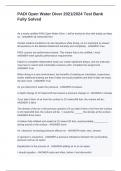
PADI Open Water Diver 2021/2024 Test Bank Fully Solved
As a newly certified PADI Open Water Diver, I will be trained to dive with buddy as deep as - ANSWER-18 meters/60 feet Certain medical conditions can be hazardous while diving, so it is important to answer all questions on the Medical Statement honestly and completely - ANSWER-True PADI courses are performance-based. This means that to be certified, I must - ANSWER-meet specific performance requirements Failure to complete independent study can create significant delays, and my instruct...
- Exam (elaborations)
- • 20 pages •
As a newly certified PADI Open Water Diver, I will be trained to dive with buddy as deep as - ANSWER-18 meters/60 feet Certain medical conditions can be hazardous while diving, so it is important to answer all questions on the Medical Statement honestly and completely - ANSWER-True PADI courses are performance-based. This means that to be certified, I must - ANSWER-meet specific performance requirements Failure to complete independent study can create significant delays, and my instruct...
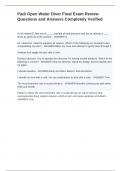
Padi Open pPadi open water Diver Final Exam Review Questions and Answers Completely Verified
At 10 metres/33 feet you're _____ bar/ata of total pressure and the air density is ___ times as great as at the surface. - ANSWER-2 As I descend, I need to equalize air spaces. Which of the following are accepted ways of equalizing my ears? - ANSWER-Block my nose and attempt to gently blow through it. Swallow and wiggle the jaw side to side. During a descent, I try to equalize but discover I'm having trouble doing so. Which of the following is correct? - ANSWER-Stop my descent, signal ...
- Exam (elaborations)
- • 1 pages •
At 10 metres/33 feet you're _____ bar/ata of total pressure and the air density is ___ times as great as at the surface. - ANSWER-2 As I descend, I need to equalize air spaces. Which of the following are accepted ways of equalizing my ears? - ANSWER-Block my nose and attempt to gently blow through it. Swallow and wiggle the jaw side to side. During a descent, I try to equalize but discover I'm having trouble doing so. Which of the following is correct? - ANSWER-Stop my descent, signal ...
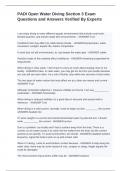
PADI Open Water Diving Section 3 Exam Questions and Answers Verified By Experts
I can enjoy diving in many different aquatic environments that include coral reefs, flooded quarries, and human-made dive environments. - ANSWER-True Conditions that may affect me while diving include. - ANSWER-temperature, water movement, sunlight, aquatic life, bottom composition In most (but not all) environments, as i go deeper the water gets - ANSWER-colder Particles made of fine material affect visibility by - ANSWER-remaining suspended for long periods When diving in clear wat...
- Exam (elaborations)
- • 7 pages •
I can enjoy diving in many different aquatic environments that include coral reefs, flooded quarries, and human-made dive environments. - ANSWER-True Conditions that may affect me while diving include. - ANSWER-temperature, water movement, sunlight, aquatic life, bottom composition In most (but not all) environments, as i go deeper the water gets - ANSWER-colder Particles made of fine material affect visibility by - ANSWER-remaining suspended for long periods When diving in clear wat...
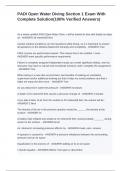
PADI Open Water Diving Section 1 Exam With Complete Solution(100% Verified Answers)
As a newly certified PADI Open Water Diver, I will be trained to dive with buddy as deep as - ANSWER-18 metres/60 feet Certain medical conditions can be hazardous while diving, so it is important to answer all questions on the Medical Statement honestly and completely - ANSWER-True PADI courses are performance based. This means that to be certified, I must.. - ANSWER-meet specific performance requirments Failure to complete assigned independent study can create significant delays, and m...
- Exam (elaborations)
- • 5 pages •
As a newly certified PADI Open Water Diver, I will be trained to dive with buddy as deep as - ANSWER-18 metres/60 feet Certain medical conditions can be hazardous while diving, so it is important to answer all questions on the Medical Statement honestly and completely - ANSWER-True PADI courses are performance based. This means that to be certified, I must.. - ANSWER-meet specific performance requirments Failure to complete assigned independent study can create significant delays, and m...
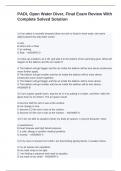
PADI, Open Water Diver, Final Exam Review With Complete Solved Solution
) If an object is neutrally buoyant (does not sink or float) in fresh water, the same object placed into salt water would A sink. B either sink or float. C do nothing. D float. - ANSWER-D 2) I blow up a balloon, tie it off, and take it to the bottom of the swimming pool. What will happen to the balloon and the air inside it? A The balloon will get bigger and the air inside the balloon will be less dense (molecules move further apart). B The balloon will get smaller and the air insid...
- Exam (elaborations)
- • 13 pages •
) If an object is neutrally buoyant (does not sink or float) in fresh water, the same object placed into salt water would A sink. B either sink or float. C do nothing. D float. - ANSWER-D 2) I blow up a balloon, tie it off, and take it to the bottom of the swimming pool. What will happen to the balloon and the air inside it? A The balloon will get bigger and the air inside the balloon will be less dense (molecules move further apart). B The balloon will get smaller and the air insid...
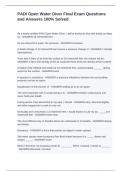
PADI Open Water Diver Final Exam Questions and Answers 100% Solved
As you descend in water, the pressure - ANSWER-increases A depth change of 10 metres/33 feet causes a pressure change of - ANSWER-1 bar/ata (atmosphere) if you take 6 liters of air from the surface to 20 metres/66 feet, the volume will be - ANSWER-2 litres (the density of the air would be three times the density at the surface) A balloon fully inflated and sealed at 10 metres/33 feet, would probably ______ during ascent to the surface - ANSWER-burst A squeeze is caused by - ANSWER-a ...
- Exam (elaborations)
- • 8 pages •
As you descend in water, the pressure - ANSWER-increases A depth change of 10 metres/33 feet causes a pressure change of - ANSWER-1 bar/ata (atmosphere) if you take 6 liters of air from the surface to 20 metres/66 feet, the volume will be - ANSWER-2 litres (the density of the air would be three times the density at the surface) A balloon fully inflated and sealed at 10 metres/33 feet, would probably ______ during ascent to the surface - ANSWER-burst A squeeze is caused by - ANSWER-a ...
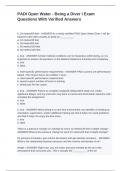
PADI Open Water - Being a Diver I Exam Questions With Verified Answers
b. 18 metres/60 feet - ANSWER-As a newly certified PADI Open Water Diver, I will be trained to dive with a buddy as deep as __________. a. 10 metres/30 feet b. 18 metres/60 feet c. 30 metres/100 feet d. 40 metres/130 feet a. true - ANSWER-Certain medical conditions can be hazardous while diving, so it is important to answer all questions on the Medical Statement honestly and completely. a. true b. false a. meet specific performance requirements - ANSWER-PADI courses are performance-b...
- Exam (elaborations)
- • 10 pages •
b. 18 metres/60 feet - ANSWER-As a newly certified PADI Open Water Diver, I will be trained to dive with a buddy as deep as __________. a. 10 metres/30 feet b. 18 metres/60 feet c. 30 metres/100 feet d. 40 metres/130 feet a. true - ANSWER-Certain medical conditions can be hazardous while diving, so it is important to answer all questions on the Medical Statement honestly and completely. a. true b. false a. meet specific performance requirements - ANSWER-PADI courses are performance-b...
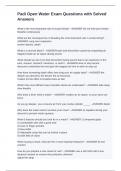
Padi Open Water Exam Questions with Solved Answers
What is the most important rule of scuba diving? - ANSWER-Do not hold your breath Breathe continuously What are the consequences of breaking the most important rule in scuba diving? - ANSWER-Lung over expansion severe injuries, death What is a reverse block? - ANSWER-pain and discomfort caused by expanding air trapped inside an air space during ascent What should you do if you feel discomfort during ascent due to air expansion in the ears, sinuses, stomach, intestines, or teeth? - ANS...
- Exam (elaborations)
- • 8 pages •
What is the most important rule of scuba diving? - ANSWER-Do not hold your breath Breathe continuously What are the consequences of breaking the most important rule in scuba diving? - ANSWER-Lung over expansion severe injuries, death What is a reverse block? - ANSWER-pain and discomfort caused by expanding air trapped inside an air space during ascent What should you do if you feel discomfort during ascent due to air expansion in the ears, sinuses, stomach, intestines, or teeth? - ANS...
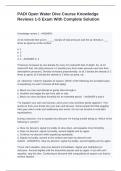
PADI Open Water Dive Course Knowledge Reviews 1-5 Exam With Complete Solution
Knowledge review 1 - ANSWER- At 10 metres/33 feet you're _____ bar/ata of total pressure and the air density is ___ times as great as at the surface. a. 1 b. 2 c. 3 d. 4 - ANSWER-b. 2 *Pressure increases by one bar/ata for every 10 metres/33 feet of depth. So, at 10 metres/33 feet, the total pressure is 2 bar/ata (one from water pressure and one from atmospheric pressure). Density increases proportionally, so at 2 bar/ata the density is 2 times as great, at 3 bar/ata the density is ...
- Exam (elaborations)
- • 9 pages •
Knowledge review 1 - ANSWER- At 10 metres/33 feet you're _____ bar/ata of total pressure and the air density is ___ times as great as at the surface. a. 1 b. 2 c. 3 d. 4 - ANSWER-b. 2 *Pressure increases by one bar/ata for every 10 metres/33 feet of depth. So, at 10 metres/33 feet, the total pressure is 2 bar/ata (one from water pressure and one from atmospheric pressure). Density increases proportionally, so at 2 bar/ata the density is 2 times as great, at 3 bar/ata the density is ...
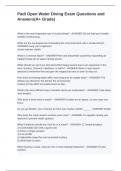
Padi Open Water Diving Exam Questions and Answers(A+ Grade)
What is the most important rule of scuba diving? - ANSWER-Do not hold your breath, breathe continuously. What are the consequences of breaking the most important rule in scuba diving? - ANSWER-Lung over expansion severe injuries, death. What is a reverse block? - ANSWER-Pain and discomfort caused by expanding air trapped inside an air space during ascent. What should you do if you feel discomfort during ascent due to air expansion in the ears, sinuses, stomach, intestines, or teeth? -...
- Exam (elaborations)
- • 8 pages •
What is the most important rule of scuba diving? - ANSWER-Do not hold your breath, breathe continuously. What are the consequences of breaking the most important rule in scuba diving? - ANSWER-Lung over expansion severe injuries, death. What is a reverse block? - ANSWER-Pain and discomfort caused by expanding air trapped inside an air space during ascent. What should you do if you feel discomfort during ascent due to air expansion in the ears, sinuses, stomach, intestines, or teeth? -...

CrossFit Level 2 prep Questions and Answers (Verified Answers)